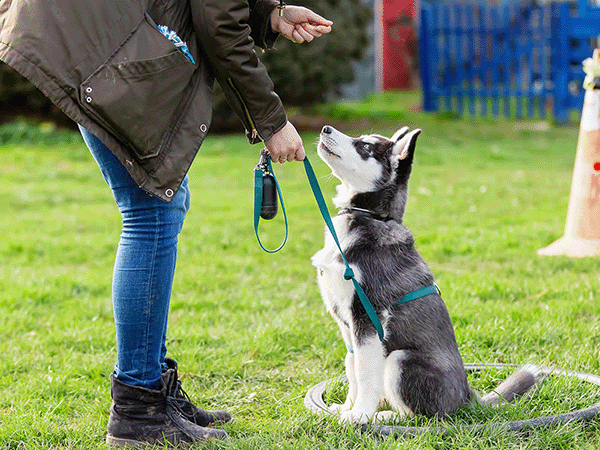Dogs Sleeping in Bed: What Real Owners Love (and Learn)

The age-old question that has divided households, sparked late-night debates, and possibly even led to a few relationship doggie disputes: should dogs sleep in your bed? It's a question about letting your dog sleep in your bed that leaves many pet parents feeling caught between a rock and a ruff place. Some swear by the comfort of canine cuddles and the benefits of sleeping with your dog, while others draw a firm line at the bedroom door, concerned about dog sleeping habits affecting their rest.
Well, get ready to have your curiosity satisfied about the pros and cons of dogs in bed! We surveyed over 2,500 dog owners across the country for our Dog Parent Survey to find out the real scoop on dog co-sleeping arrangements. Our comprehensive dog sleep survey results will have you howling with surprise!
Jump Ahead: Should Dogs Sleep in the Bed?
- How Many People Let Their Dogs Sleep in Their Bed?
- The Big Picture: Who's Letting Their Dogs Sleep in Bed?
- The Benefits of Dogs Sleeping in Bed With You
- The Downsides of Dogs Sleeping in Bed: Cons to Consider
- What Influences Our Decisions on Dogs Sleeping in Bed?
- Expert Recommendations: Finding What Works For Dog Co-Sleeping
- Tips for Successful Bed-Sharing Based on Survey Results
- Frequently Asked Questions About Dogs Sleeping in Bed
- The Bottom Line: Should You Let Your Dog in Bed?
How Many People Let Their Dogs Sleep in Their Bed?

The Big Picture: Who's Letting Their Dogs Sleep in Bed?
Our dog sleep survey reveals that a whopping 82% of dog owners regularly share their beds with their four-legged companions. That's nearly half of all pet parents choosing to catch their Z's with dogs sleeping in bed by their side (or often, right on top of them). This statistic closely mirrors national findings about dog co-sleeping habits and confirms that letting your dog sleep in your bed is a common practice across the country.
"I wouldn't dream of sleeping without my German Shepherd mix curled up against my legs," shared one survey respondent. "Having her in bed makes me feel protected."
But what about the other 18%? Well, they have their reasons too, which we'll dig into as we uncover the benefits and drawbacks that real dog owners experience.
The Benefits of Dogs Sleeping in Bed With You
Why do so many owners welcome their dogs into bed with them? For most, it comes down to four factors: security, better sleep, emotional support, and bonding.

The survey responses indicated a potential correlation between dog size and reported sleep quality. Owners of smaller dogs generally reported fewer sleep disruptions than owners of larger breeds, which makes sense when considering bed space requirements and movement disruption.
Dogs are proven to generally improve their owner's mental wellbeing. According to psychologists, 86% of dog owners report their dog having a positive impact on overall mental health. This doesn't end at bedtime!
Finally, many bed-sharing dog owners expressed belief that sleeping together strengthened their relationship with their pet.
The Downsides of Dogs Sleeping in Bed: Cons to Consider
Of course, it's not all sweet dreams and cozy cuddles. Our survey revealed several common challenges that come with letting your dog sleep in your bed. Understanding these potential cons of dogs in bed is essential for making an informed decision about your own dog sleeping habits.
What are these potential cons of having your dog in bed? Sleep quality, cleanliness, relationships, and potential behavior issues.

The survey responses suggested that larger dogs were more likely to cause sleep disruptions compared to smaller dogs, likely due to the space they occupy and their movement during sleep. Similarly, inviting your dogs in the best could introduce cleanliness concerns.
Among couples, a notable portion reported that sharing the bed with dogs sometimes created relationship tension. Common issues included disagreements about whether the dog should be allowed in bed at all, complaints about limited space, and disrupted intimacy.
Lastly, dogs with existing behavior issues like reactivity, separation anxiety, or resource guarding could experience additional challenges. Owners might find that bed sharing with their pups makes these behavior issues worse.
What Influences Our Decisions on Dogs Sleeping in Bed?
Our survey revealed several interesting patterns in who allows dogs in bed, with relationship status being particularly notable:
- Dog size matters: The survey indicated that small dogs were allowed in bed more frequently than medium dogs, while large dogs were least likely to share the bed with their owners.
- Age of owner: Younger respondents appeared more likely to share their bed with their dog compared to older survey participants.
- Geographic location: Urban dwellers reported allowing dogs in bed more frequently compared to rural respondents.
- Relationship status: Single people were more likely to share their bed with their dog than married people.
Dogs in Bed and Relationship Dynamics
The relationship between dog sleeping arrangements and human romantic relationships was particularly interesting in our survey results:
- Couple conflicts: Among couples, some reported that sharing the bed with dogs sometimes created relationship tension or arguments.
- Space complaints: The top reason for bed-related disagreements was space limitations, with many couples reporting they sometimes felt crowded with a dog in bed.
- Sleep disruption differences: Interestingly, some couples reported that one partner's sleep was disrupted by the dog while the other partner slept fine, leading to disagreements.
- Compromise solutions: Many couples who initially disagreed about dogs in bed reported finding compromise solutions, such as using a larger bed, having the dog sleep at the foot rather than between partners, or limiting bed access to certain times.
Expert Recommendations: Finding What Works For Dog Co-Sleeping
While our survey reveals fascinating insights into dogs sleeping in bed with their owners nationwide, the most important takeaway is that there's no one-size-fits-all answer. Each dog-human relationship is unique, and the benefits of sleeping with your dog that work for one household might create challenges in another. Making an informed decision about letting your dog sleep in your bed depends on understanding your specific situation.
From our survey data, we can see that sleeping arrangements often evolve over time as dogs and owners adjust to each other's preferences and sleep patterns. If you're uncertain about whether to let your dog sleep in your bed, consider starting with a trial period to see how it affects your sleep quality and your dog's behavior.

Tips for Successful Bed-Sharing Based on Survey Results
If you decide that letting your dog sleep in your bed is right for you, our survey results suggest these approaches tend to be most successful:
- Establish routine - Dog owners who report the best sleep quality typically have consistent bedtime routines with their dogs.
- Consider your dog's hygiene - Regular bathing and grooming were strongly correlated with satisfaction among bed-sharing dog owners.
- Use a designated blanket or cover - Many respondents use a special blanket over the comforter where their dog sleeps, which can be easily washed or removed.
- Consistent rules - Survey participants who reported the fewest behavioral issues had clear, consistent rules about when and where their dogs could sleep.
- Trial periods - Many respondents started with temporary arrangements before committing to permanent sleeping situations.
Frequently Asked Questions About Dogs Sleeping in Bed
Is it bad to let your dog sleep in your bed?
No, it's not inherently bad to let your dog sleep in your bed. According to our survey of 2,500 dog owners, 82% regularly share their beds with their dogs.
The decision depends on your personal preferences, sleep quality, and your dog's behavior. Some people report better sleep with their dogs, while others experience disruptions. Consider factors like allergies, cleanliness, and your dog's training before making this decision.
Do dogs prefer sleeping in bed with their owners?
Many dogs do prefer sleeping in bed with their owners. Our survey showed that dogs who are allowed in bed rarely choose to sleep elsewhere when given the option.
Dogs are naturally pack animals, and sleeping near their "pack members" (you) often provides them with security and comfort. However, some dogs, particularly more independent breeds, may prefer their own space.
Will letting my dog sleep in my bed cause behavior problems?
Letting your dog sleep in your bed does not directly cause behavior problems. This is a common misconception. However, survey respondents noted that if their dog already has issues like resource guarding or separation anxiety, bed-sharing could potentially reinforce these behaviors. Setting clear boundaries and consistent training are key regardless of where your dog sleeps.
Does sleeping with your dog help with anxiety?
Yes, sleeping with your dog can help with anxiety for many people. Researchers at UC Davis suggest there are many emotional and mental health benefits to feeling close with your dog, including reduced anxiety and stress. Physical contact with dogs releases oxytocin, which promotes feelings of calmness and security.
How do I stop my dog from moving around so much in bed?
To reduce your dog's nighttime movement in bed, ensure they get sufficient exercise during the day to burn excess energy. Establish a consistent bedtime routine that includes a bathroom break. Consider using a designated dog blanket or bed on top of your bed to create a specific sleeping area. Some survey participants found success with weighted dog blankets or training their dogs to sleep in specific positions.
Will sleeping with my dog affect my relationship with my partner?
It might. Among couples in our survey, 34% reported that having a dog sometimes created relationship tension. Common issues included space limitations, sleep disruptions, and differing opinions about where the dog should sleep. Communication with your partner and compromises (like a larger bed or alternating nights) can help address these challenges.
Is it unhygienic to sleep with your dog?
While dogs do carry some dirt and bacteria, sleeping with a well-groomed dog isn't significantly unhygienic for most people. Regular bathing, brushing, and paw-cleaning can minimize concerns. However, those with allergies or compromised immune systems should consult with healthcare providers.
The Bottom Line: Should You Let Your Dog in Bed?
Our survey of 2,500 dog owners shows that there's significant diversity in sleeping arrangements, and most households find what works through trial and error.
The data indicates that preferences about dogs in bed often change over time, suggesting that flexibility is key. What works during one life stage might change during another, and what works for one relationship might not work for another.
For couples, communication about sleeping arrangements appears to be particularly important. Those who reported discussing their preferences openly before bringing a dog into the bed were significantly less likely to report relationship tension over the issue later.
Whether you're Team Dog-in-Bed or firmly in the dogs-on-the-floor camp, the most important thing is that both you and your furry companion get the rest you need. After all, a well-rested dog parent makes for a happier human, and a well-rested pup makes for a happier dog!
About our survey: The "Pawsitively Fun Dog Parent Survey" collected responses from 2,506 dog owners across all 50 states. Participants ranged in age from 18 to 72 and owned dogs of all sizes and breeds. The survey was conducted online in March 2025.
Most recent articles
Related articles
Top dog guides per area
Dog training guides

Dog Food Aggression: Why You Shouldn't Punish It
Does your dog ever growl when you walk by their food dish? Maybe they get possessive of treats, carrying them far away and giving you side-eye when you start to approach — or snarling at your other pets or children if they get too close.

Best Dog Fields in the US: 25+ Wide-Open Spaces for Your Pup to Run Free
The best dog fields in the US offer something that traditional enclosed parks simply can't match: acres of open space where your pup can truly stretch their legs and run at full speed. From Colorado's 470-acre prairie meadows to Tennessee's award-winning "Outback," these wide-open spaces allow dogs to roam, explore, and exercise naturally while engaging instincts that cramped urban parks suppress.

The Ultimate Guide to Scent Training for Dogs
Your dog's nose is an amazing tool. Did you know they have 40 times the olfactory receptors than humans? Scent training for dogs taps into this superpower, turning everyday moments into exciting sniff-fests. It's enriching for all types of dogs – reactive, shy, or simply adventurous. Ready to explore the world of scent work for dogs? Let's get started.

Service Dog Training Costs: DIY vs. Pro
More than 80 million Americans rely on their service dogs to help them navigate the world. Task-trained assistance animals perform a huge range of life-changing—in many cases, life-saving—services: These dogs act as eyes for visually impaired handlers, provide mobility support, alert to seizures and blood sugar crashes, interrupt anxiety attacks, remind their people to take medications, and so much more.

How to Deal With Puppy Potty Training Regression

Dirty Dog Syndrome: Causes, Solutions, and Prevention
It's a cringe-worthy moment every dog owner dreads: your furry friend chowing down on something truly disgusting. If your dog has a penchant for poop, you're dealing with coprophagia. It's more common than you think, and thankfully, often manageable. This article explores the reasons behind dirty dog syndrome, from instinct to learned behavior. We'll also give you practical tips to help break this unpleasant habit.

How to Train Your Rescue Dog: A Complete Guide
* All Sniffspot articles are reviewed by certified trainers for quality, please see bottom of article for details *
Dog enrichment guides

Best Dog Water Parks in the US: 15+ Amazing Splash Destinations for Your Pup
Do you have a water-loving dog looking to burn some energy? There are countless dog parks to visit throughout our country — but some of them become far too hot in the midday sun to be safe for your pets to play. That’s why we’ve put together a list of some of the best dog water parks throughout the United States! At these locations, your pup can frolic, splash, and swim to their heart’s content.

Best Dog Fields in the US: 25+ Wide-Open Spaces for Your Pup to Run Free
The best dog fields in the US offer something that traditional enclosed parks simply can't match: acres of open space where your pup can truly stretch their legs and run at full speed. From Colorado's 470-acre prairie meadows to Tennessee's award-winning "Outback," these wide-open spaces allow dogs to roam, explore, and exercise naturally while engaging instincts that cramped urban parks suppress.

Best Toys for Herding Dogs: Keeping Your Pup Happy & Engaged
Herding dogs are amazing, intelligent companions. But that also means they need more than just a simple game of fetch. Finding the right toys for herding dogs is key to keeping them happy and stimulated. This article explores some of the best toys for herding dogs, including options specifically for breeds like Border Collies and Australian Shepherds. We'll help you discover the perfect herding toys for dogs to tap into their natural instincts and keep them entertained for hours.

Tough Dog Toys for Aggressive Chewers: A Practical Guide
Does your dog destroy every toy you give them? Is your house littered with the remnants of plush toys? Are you tired of wasting money on "indestructible" dog toys for aggressive chewers that don't last? Then this post is for you. We'll cover everything you need to know about finding the best dog toys for aggressive chewers, so you can finally give your pup something safe, durable, and fun.

Daily Exercise Calculator: How Much Exercise Does Your Dog Need?
Everyone knows dogs need exercise, but how much is enough? Walks are great, but creating a truly balanced fitness plan means understanding your dog's specific needs. This post helps you develop a daily exercise calculator for your dog, considering breed, age, and lifestyle. We'll cover fun activities, understanding exercise intensity, and recognizing when your pup has had enough. Let's create a plan that keeps your dog happy and healthy!

Complete Guide To Herding With Dogs
* All Sniffspot articles are reviewed by certified trainers for quality, please see bottom of article for details *

Dog Enrichment Activities: The Ultimate Guide
Ever feel like your dog is restless or bored? They may be getting enough exercise, but still need more. That's where enrichment activities for dogs come in. Giving your dog opportunities to sniff, explore, and problem-solve can make a world of difference. Whether you have a puppy, adult, or senior dog, enriching their environment is key for their well-being. Let's explore how to add cognitive enrichment for dogs, even tailoring activities to your dog's breed with breed specific enrichment and fun enrichment games for dogs.
Dog reactivity guides

Rottweiler Aggression: Truth vs. Myth
Many dogs have gotten a bad reputation over the years for being "dangerous breeds." Rottweilers are among them. Like pit bulls and other large, blocky-headed types of dogs, these powerful and beautiful animals are often assumed to be aggressive.

Best Dog Fields in the US: 25+ Wide-Open Spaces for Your Pup to Run Free
The best dog fields in the US offer something that traditional enclosed parks simply can't match: acres of open space where your pup can truly stretch their legs and run at full speed. From Colorado's 470-acre prairie meadows to Tennessee's award-winning "Outback," these wide-open spaces allow dogs to roam, explore, and exercise naturally while engaging instincts that cramped urban parks suppress.

What Is a Reactive Dog? A Practical Guide for Owners
Does your dog suddenly transform into a barking, lunging Tasmanian devil on walks? It's stressful for both of you. If this sounds familiar, you might have a reactive dog. Understanding what is a reactive dog is the first step to calmer walks. We'll explore the common triggers and give you actionable strategies to manage and modify this behavior. Let's turn those stressful walks into enjoyable outings.

How to Socialize a Reactive Dog: A Step-by-Step Guide
Does your dog display reactivity to other pets or people—barking, lunging, or growling when they see their triggers? Whether they're a rescue still settling in, missed critical socialization as a puppy, or had a negative experience, you're not alone. Reactivity is one of the most common dog behavior concerns, and with the right approach, you can help your reactive dog feel calmer and more confident around their triggers.

What Is a Reactive Dog? The Complete Guide for Understanding and Helping Your Pup
Does your dog transform into a barking, lunging tornado the second they spot another dog across the street? You're definitely not alone. According to our research of over 4,000 dog owners, 66% of dogs show some signs of reactivity.

9 Best Online Communities for Reactive Dog Parents
Does your dog's reactivity make walks stressful? You're not alone. Many dog owners face similar challenges. This guide offers practical advice and support for managing reactivity, including finding the best online dog training for reactive dogs. We'll connect you with reactive dog support groups, share training tips, and explore resources like the best dog training app for reactive dogs. Let's build a stronger bond with your dog, together.
* All Sniffspot articles are reviewed by certified trainers for quality, please see bottom of article for details *
How To Groom a Reactive Dog
* All Sniffspot articles are reviewed by certified trainers for quality, please see bottom of article for details *
Sniffspot community guides

The State of Public Dog Parks Across the United States
From 2009 to 2020, there was a 40 percent increase in the development of public dog parks. Designated spots for canine exercise have become commonplace in every major city in North America — many pet owners won’t even consider renting an apartment that doesn’t have its own fenced-in pet area for their canine companions.

Best Dog Fields in the US: 25+ Wide-Open Spaces for Your Pup to Run Free
The best dog fields in the US offer something that traditional enclosed parks simply can't match: acres of open space where your pup can truly stretch their legs and run at full speed. From Colorado's 470-acre prairie meadows to Tennessee's award-winning "Outback," these wide-open spaces allow dogs to roam, explore, and exercise naturally while engaging instincts that cramped urban parks suppress.

How This Family is Affording Their Dream Property Through Renting it Hourly to Dogs
Thousand Oaks, California has been a safe haven for Sniffspot host, Jen, since childhood. Having grown up in busy Santa Barbara, Jen, an introvert from an early age, would seek out solitude and serenity away from tourists attractions and droves of people visiting from elsewhere. “My grandparents own 60 acres about a 30 minute drive from here, and I grew up spending every summer and every holiday visiting them on the ranch,” Jen explained. “In Santa Barbara, we wouldn't go to the beach on the weekend because that's where everybody was, so you'd find places off the beaten path where the tourists weren't. For me, the ranch was just my happy place.”

Host Tips: Ellen K. What Makes Sniffspot Successful for Me
Ellen is the host of Country Pasture Getaway, one of Sniffspot's most popular sniff spots. She has taken the time to write up the lessons she has learned about how to be a great sniff spot host.

How this Oregon Farmer is Making a Business From Renting Her Land to Dogs
Just 20 minutes outside of the busy city of Portland, Oregon, and settled right on the banks of the Columbia River, you’ll find what countless visitors have flocked to the area in search of – mountain views, crisp, clean air, and running water for miles. What you might not expect to find, however, is a hidden oasis designed just for dogs and their people, owned and operated by a farming couple and enjoyed by visitors on two legs, and four.

Host Tips: Fran T. Providing Great Guest Service at our Spot
Fran is the host of Ranch Setting, one of Sniffspot's most popular spots. She has taken the time to write up the lessons she has learned about how to be a great Sniffspot host.

How Sniffspot Helped a Nervous Rescue Work Through His Fears and Change His Family’s Life
This is the story of a family and dog rescuing each other.
Top dog trainers in the US

The Best Dog Trainers in the United States of 2026
This is a list of the top dog trainers in the United States, based on votes from the Sniffspot community and the general public.
The Best Dog Trainers in Seattle, WA of 2026
This is a list of the top dog trainers in Seattle, WA, based on votes from the Sniffspot community and the general public.
The Best Dog Trainers in Portland, OR of 2026
This is a list of the top dog trainers in Portland, OR, based on votes from the Sniffspot community and the general public.
The Best Dog Trainers in Los Angeles, CA of 2026
This is a list of the top dog trainers in Los Angeles, CA, based on votes from the Sniffspot community and the general public.
The Best Dog Trainers in New York, NY of 2026
This is a list of the top dog trainers in New York, NY, based on votes from the Sniffspot community and the general public.
City dog parks guides

Top 10 Indoor Dog Parks: A US Guide
Looking for a space to play with your dog no matter what the weather’s like outside? Look no further than our list of the best indoor dog parks in the United States! These climate-controlled spaces are growing in popularity as pet ownership increases throughout the country. As a bonus, many of them also offer dog training, boarding, grooming, or daycare services on the premises.

Best Dog Fields in the US: 25+ Wide-Open Spaces for Your Pup to Run Free
The best dog fields in the US offer something that traditional enclosed parks simply can't match: acres of open space where your pup can truly stretch their legs and run at full speed. From Colorado's 470-acre prairie meadows to Tennessee's award-winning "Outback," these wide-open spaces allow dogs to roam, explore, and exercise naturally while engaging instincts that cramped urban parks suppress.

Best Dog Parks in the US: Ultimate Guide to Public & Private Off-Leash Adventures
Is your pup giving you those pleading "let me run free" eyes? Whether you're a new dog parent or a seasoned pro looking for fresh adventures, finding the perfect off-leash paradise for your furry friend can feel ruff! From sun-soaked California beaches where your water-loving lab can make a splash to mountain trails in Vermont where your adventure buddy can chase every scent, we've sniffed out the 15 best dog parks across America.

Dog Parks Near Me: Las Vegas Edition
Looking for the perfect dog park near me in Las Vegas? You're in luck! This guide explores all the best options for your pup, from public dog parks to private dog parks near me on Sniffspot. We'll help you find the ideal spot for playtime, socializing, and fresh air. Plus, we'll cover essential etiquette and safety tips to ensure a happy visit for everyone. Get ready for some tail-wagging fun!

Top Sniffspot Locations: Find the Perfect Dog Park
Looking for the perfect dog park? Whether you need a wide-open public space or a private, fenced-in spot, this guide will help you find the best dog parks across the US. We'll cover top-rated public parks, the perks of private dog parks, and even explore Sniffspot locations – giving your pup a safe and fun place to play. Ready to find your dog's new favorite spot? Let's go!

Sniffspot: Portland's Best Private Dog Parks
Ready to discover Portland's best dog parks? Whether you're looking for a public park or the unique experience of a private Sniffspot, this guide has you covered. We'll help you find the perfect spot for your pup, with tips on what to bring, how to prepare, and even understanding dog body language. Plus, we'll explore some top Portland dog parks, including public and Sniffspot options, so you can plan your next dog-friendly adventure in the City of Roses.
Portland Dog Parks: Public & Private Options
This page is about public city dog parks and also includes Sniffspot private dog parks. Sniffspot is the largest network of private dog parks for rent in the world!
Small Dog Park Guide: Tips for Finding the Perfect Spot
Finding the perfect dog park for your small breed can be ruff! Big dog parks can be overwhelming, even dangerous, for little pups. This comprehensive guide helps you sniff out the best small dog parks for your pint-sized companion, covering everything from essential safety checklists to top recommendations for small dog parks across the US—including both public spots and private dog parks.
Dogs breeds

German Shepherd Guide: Best Family Dog? Truth from 9K Owners
The German Shepherd Dog (GSDs) are known for their intelligence, loyalty, and striking appearance. They're also incredibly versatile, excelling as working dogs and devoted family companions. This guide covers everything you need to know about GSDs, from understanding their unique traits and rich history to practical advice on training and care. So, whether you're a seasoned GSD owner or just starting your research, let's explore this remarkable breed together.

Best Dog Fields in the US: 25+ Wide-Open Spaces for Your Pup to Run Free
The best dog fields in the US offer something that traditional enclosed parks simply can't match: acres of open space where your pup can truly stretch their legs and run at full speed. From Colorado's 470-acre prairie meadows to Tennessee's award-winning "Outback," these wide-open spaces allow dogs to roam, explore, and exercise naturally while engaging instincts that cramped urban parks suppress.

Labrador Retriever: America's Best Family Dog? Owner Truth
Discover the Labrador Retriever, a breed celebrated for its playful nature, affectionate temperament, and trainability. Labradors are known for their friendly demeanor and adaptability, making them perfect family companions and versatile working dogs. As one of the most popular types of retrievers, Labs are ideal companions for various lifestyles and are recognized by the American Kennel Club (AKC) as an excellent breed for families.

Golden Retriever Advice: The Complete Owner's Guide
Golden Retrievers: they're gorgeous, playful, and incredibly popular. But before you welcome one into your home, you need the right golden retriever advice. This guide draws on the wisdom of nearly 10,000 Golden Retriever owners, offering practical tips for caring for these affectionate dogs. From understanding their high energy levels to mastering grooming and training, we'll cover everything you need to know. So whether you're already a devoted Golden parent or just starting your research, get ready to learn how to give your furry friend the best possible care.

Are American Staffordshire Terriers Good for First-Time Owners: Complete Guide
Think American Staffordshire Terriers are tough? Think again. While their muscular build might intimidate some, these dogs are known for their playful and loyal personalities. This guide draws on the experience of nearly 10,000 AmStaff owners to reveal the truth about this often misunderstood breed. Want to learn more about caring for an American Staffordshire Terrier? You're in the right place.

Australian Shepherd Facts: Breed Info & Care Guide
Discover the Australian Shepherd, an AKC breed celebrated for its trainable, playful, and affectionate nature. Despite its name, the Australian Shepherd is actually a native breed to the United States, originally developed to breed on farms and ranches. Considered a medium dog, Australian Shepherds were bred for herding beginning in the 1950s. As one of the high-energy breeds, Aussies are known for their boundless energy and need for regular exercise, including aerobic exercise.

Essential Husky Facts for Owners: Breed Guide
Discover the Siberian Husky, a breed celebrated for its curious, intelligent, and loyal nature. Considered a medium-sized dog, Siberian Huskies were originally bred in Russia for sledding, beginning in the early 20th Century. Today, they're one of the most popular active breeds in North America.



























